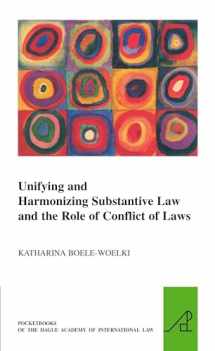
Unifying and Harmonising Substantive Law and the Role of Conflict of Laws (Pocketbooks of the Hague Academy of International Law)
ISBN-13:
9789004186835
ISBN-10:
9004186832
Edition:
Illustrated
Author:
Katharina Boele-Woelki
Publication date:
2010
Publisher:
Martinus Nijhoff
Format:
Paperback
274 pages
Category:
Conflict of Laws
,
Legal Theory & Systems
FREE US shipping
on ALL non-marketplace orders
Marketplace
from $5.17
USD
Marketplace offers
Seller
Condition
Note
Seller
Condition
Used - Very Good
Book details
ISBN-13:
9789004186835
ISBN-10:
9004186832
Edition:
Illustrated
Author:
Katharina Boele-Woelki
Publication date:
2010
Publisher:
Martinus Nijhoff
Format:
Paperback
274 pages
Category:
Conflict of Laws
,
Legal Theory & Systems
Summary
Unifying and Harmonising Substantive Law and the Role of Conflict of Laws (Pocketbooks of the Hague Academy of International Law) (ISBN-13: 9789004186835 and ISBN-10: 9004186832), written by authors
Katharina Boele-Woelki, was published by Martinus Nijhoff in 2010.
With an overall rating of 3.7 stars, it's a notable title among other
Conflict of Laws
(Legal Theory & Systems) books. You can easily purchase or rent Unifying and Harmonising Substantive Law and the Role of Conflict of Laws (Pocketbooks of the Hague Academy of International Law) (Paperback) from BooksRun,
along with many other new and used
Conflict of Laws
books
and textbooks.
And, if you're looking to sell your copy, our current buyback offer is $0.23.
Description
Traditionally, conflict of law rules designate only national substantive law as the applicable law. Many unifying and harmonizing substantive law instruments of both States and non-State organizations, however, are designed specifically for application to cross-border relationships. Achieving this objective is, generally, hindered by conflict of law rules. The requirements which non-national law needs to fulfil in order to be accepted as the law governing a cross-border relationship deserve clarification. Not only uniform law, such as the CISG and the envisaged European substantive law instrument for the law of obligations, but, particularly, instruments which are aimed at harmonizing substantive law, challenge the established systems of conflict of laws. In seeking a positive approach towards the application of a law other than national law various aspects need to be considered: (1) is the decision taken by a court or an arbitral tribunal; (2) what field of law (contract/delict/tort or family relationships) is involved; and (3) the objective or subjective (choice by the parties) designation of the applicable law.


We would LOVE it if you could help us and other readers by reviewing the book
Book review

Congratulations! We have received your book review.
{user}
{createdAt}
by {truncated_author}


